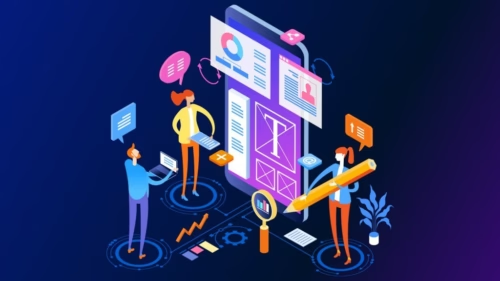Are you interested in hiring an R developer?
This article will answer all the most popular questions about R development.
R programming language emerged in 1993. Despite all the years that have passed, it remains very popular.
In addition to being an open-source programming language, R also offers an integrated suite of software suitable for data manipulation, calculations, and graphical display. If you are a data scientist or statistician, R is probably a familiar favorite. You can also build interactive web apps with the help of Shiny, a popular R package.
You can use R for a wide range of solutions. The language lends itself well to various purposes, such as machine learning, data analysis, data science, data visualization, big data, statistical computing, data mining, econometrics, statistical analysis, and deep learning.

Get a complimentary discovery call and a free ballpark estimate for your project
Trusted by 100x of startups and companies like
The TIOBE index consistently cites the popularity of R, moreover, the Stack Overflow developer surveys do too. Google utilizes R heavily in its large-scale data analytics and machine learning projects.
Scala has acquired a great reputation in the data science area, too. However, R delivers excellent performance in several areas and commands a greater following. Take the example of data visualization using Excel spreadsheets. You can use RStudio, a popular IDE for R. The user-friendliness of RStudio and the power of R can help you achieve excellent analytics. If you are a data analyst, you can now shelve that spreadsheet.
While more and more developers are interested in this language, the demand for these developers is also growing. Remember that R has a steeper learning curve than other analytics-focused languages such as SAS. Therefore, you might find it hard to hire a competent R developer.
You will need to begin by choosing a hiring platform. We will touch upon this shortly.
After you decide on the hiring platform, you need to interview the candidates. We suggest that you look for the following skill sets:
R programming skills
You need developers with the following skills:
- In-depth skills and experience in R;
- Sufficient knowledge in at least one of the following languages: Python, C++, Java, Perl, and Ruby;
- Adequate knowledge in computer science.
The above are fundamental skills requirements. Your project will likely involve several other aspects, like ETL, creating a web app, etc. Therefore, successful R programmers should also know the following:
- RStudio, the well-known IDE for R;
- Well-known R machine learning packages like CARET;
- Popular ETL tools like Apache Spark or Panoply for data processing;
- How to integrate R with other popular web development languages like PHP;
- Popular packages like OpenNLP that help with NLP and text mining;
- How to use R for machine learning development;
- How to use robust databases like Oracle for R programming;
- Using R in popular software like Tableau;
- How to create time series analysis using R;
- Using R with Hadoop for big data analytics;
- How to use R Shiny, the popular package to build interactive web apps;
- Using the data mining capabilities of R in projects like social media data analysis;
- How to use prominent R big data packages;
- How to use the data visualization capabilities of R.
If you have unique requirements that specific R packages can serve, you must also look for those skills.
Note: Despite its strengths, R does have a few limitations. For example, this programming language has limitations concerning data management. To be an effective R programmer, one needs to know how to manage such limitations. To take yet another example, R offers a limited number of algorithms for decision trees. An effective R developer needs a good understanding of premium tools like SPSS that provide comprehensive decision-tree algorithms. This understanding will help them generate ideas to circumvent R's algorithm-related limitations.
Other software development skills required for R development
An application developer working on the R language needs more skills, which are as follows:
A. The skills to code scalable applications
R Developers need to understand scalability requirements and which performance metrics are most important to meet them. They should know which development frameworks and database solutions help to create scalable applications. R Programmers also need to know the best practices that enable them to develop scalable apps.
B. The knowledge and experience to secure applications
You will most likely process some form of sensitive information in your application. Given the focus on information security, users demand apps that protect sensitive data. Governments and regulators have come up with stringent data security and privacy regulations, too.
You need programmers who know the following:
- How to proactively identify and mitigate key application security vulnerabilities;
- Using techniques and tools like multi-factor authentication (MFA), encryption, etc. to secure applications;
- The importance of collaborating with testers and DevOps engineers to ensure security testing early enough in the life cycle.
C. The skills to develop 1st party APIs
APIs provide a consistent framework for the front-end of your app to access the back-end. Therefore, you will likely want to create your own APIs. You need R programmers who can develop RESTful APIs. They need to know the following:
- How to use API development and documentation tools;
- How to use cloud platforms to host APIs;
- Using modern database solutions to build the back-end;
- How to create effective rules for API requests and responses;
- How to design API endpoint URLs smartly;
- Using techniques like authentication tokens, encryption, etc. to secure APIs.
D. Knowing how to succeed in a software development project
You need developers with the competencies, skills, and experience to achieve success in software development. The R programmer you hire should know the following:
1,200 top developers
us since 2016
- How to use popular cloud platforms like AWS;
- Coding in alignment with the architectural decisions made in the project;
- How to collaborate with testers and DevOps engineers, which is very important in establishing an effective CI/CD environment.
- How to review code, since code reviews can unearth defects earlier in the development lifecycle.
How to find the best R developer?
Now you know the skills and competencies that you need, it’s time for you to set in motion the hiring process. Take the following steps:
1. Decide what kind of platform to hire R developers
You need to choose the right hiring platform. This goes a long way to ensure that you hire competent people.
General purpose freelance platforms can easily connect you to R developers. You might be able to bargain a favorable hourly rate, however, remember that working with freelancers can be risky.
Freelancers need a stable income, therefore, they take on multiple projects. R programming can be complex, and working with part-time freelancers can be hard with complex projects.
Software development-focused freelancer platforms are a much better place to get an R programmer. Thanks to their stringent screening processes, they only hire good developers. However, such sites don’t offer any management support. You are left to deal with all the risks associated with freelance developers.
Software development companies such as DeTeam.Space can help you hire a full-time expert R developers.
We have a simple and transparent contracting process where we do all the work for you. All of our developers are full-time members of our community and have been vetted to ensure that they are the best at what they do. We also implement physical, technical, and procedural safeguards such as NDAs to protect your intellectual property.
2. Interview the shortlisted candidates to find the top R developers
Now that you have decided which hiring platform to use, you need to interview the candidates.
If you are an expert in the R programming language, you can conduct interviews. Otherwise, you need to get interview questions from Stack Overflow or similar websites. You could also ask a business associate with expertise in R to conduct the interviews.
Take sufficient time and cover all the skills we have mentioned. Review the portfolios of the candidates and ask them about the complex projects that they have worked on. Ask how they have handled the various complexities in these projects.
Explain your project requirements to candidates and ask them how they would approach your project. You should expect specific recommendations.
3. Provide all relevant information about your app development project
Developers need relevant information to succeed in your project. Provide all the relevant documentation, like requirements, technical solutions, etc. Introduce the R developer you hire to your larger team. Set up a process for communications.
Provide the required access to the technical environment of your project. Show your code repository to the R programmer you hire. Explain the sprints in your project and describe how you will review milestones. Set accountability for deliverables and explain the roles and responsibilities. Explain the payment T&Cs. You are now ready to start them working.
Interview tips to hire R programmers
The following interview tips could help you hire competent R software developers:
A. Identify your critical requirements clearly first
Why do you need R developers? Answer this question first. This will help you channel your efforts effectively when you interview the candidates.
Are you looking for data scientists? Do you have large-scale data analysis tasks in your project? Does your project involve data modeling? Do you need statistical software?
R is one of the versatile programming languages. You can use it in data analysis projects. It’s useful in research projects that involve analyzing data at a large scale. You can use R for data extraction, data visualization, machine learning, and statistical computing. This programming language has proved its mettle in data science projects, too.
However, you need developers with relevant experience. Assess whether candidates have what you need. First, get clarity over what’s most important to you!
B. Hire sufficiently experienced developers
R is a relatively complex language. R developers need a pronounced learning curve. An R developer with the requisite experience can be an asset.
Don’t plan to hire only junior developers. Evaluate the hands-on experience of the candidates. This can be hard when you interview remote R developers, and it’s harder if you interview freelance R developers.
We at DevTeam.Space can make your life easier. Our vetting process ensures that you will get sufficiently experienced and skilled R programmers.
C. Look for R programmers with experience in coding secure applications
Complex tasks like data management, data manipulation, data processing, statistical analysis, etc., require a high focus on data security. R can considerably help with all of these tasks. However, R isn’t one of the most secure programming languages.
You need software developers with experience in coding secure R applications. Assessing this can be hard. Hire R programmers from trusted hybrid software development companies like DevTeam.Space. We have stringent screening processes.
Examples of interview questions to ask when you hire R developers
Ask questions that help you to evaluate the practical knowledge of a candidate. The following are a few R language interview questions:
A. Mention a few data mining packages in R.
Answer: The following are notable examples of data mining packages in R:
- data.table;
- rpart and caret;
- Arules;
- GGplot;
- Forecast.
B. How to do a left-join in the R language?
Answer: You can use the “dplyr” package for this. Assume you have two data sets with a common key. You can use the “left_join()” column by mentioning the data set names and the key. The syntax is as follows:
Left_join(dataset1,dataset2,by=key-value)
C. How to convert the values in a vector of numbers to scientific notation?
Answer: You can use the “format()” function in R to convert the values in a vector of numbers to scientific notation. The syntax is as follows:
formatC(vector name, format=”e”)
Submit a Project With Zero Risk
We suggest that you take a few minutes to fill out DevTeam.Space's product specification form can be found by clicking the button below. A dedicated account manager from DevTeam.Space will contact you and explain how our experienced R developers can help you succeed in your project.








